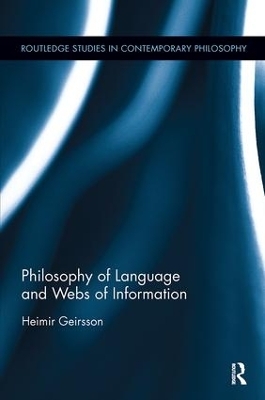
Philosophy of Language and Webs of Information
Seiten
2017
Routledge (Verlag)
978-1-138-10809-7 (ISBN)
Routledge (Verlag)
978-1-138-10809-7 (ISBN)
Geirsson's account of the nature of propositions and the cognitive value of names focuses on subjects organizing information in webs; a name can then access and elicit information from a given web. He proceeds to extend the account of information to non-referring names that have long provided a serious challenge to the causal reference theorist.
The nature of propositions and the cognitive value of names have been the focal point of philosophy of language for the last few decades. The advocates of the causal reference theory have favored the view that the semantic contents of proper names are their referents. However, Frege’s puzzle about the different cognitive value of coreferential names has made this identification seem impossible. Geirsson provides a detailed overview of the debate to date, and then develops a novel account that explains our reluctance, even when we know about the relevant identity, to substitute coreferential names in both simple sentences and belief contexts while nevertheless accepting the view that the semantic content of names is their referents. The account focuses on subjects organizing information in webs; a name can then access and elicit information from a given web. Geirsson proceeds to extend the account of information to non-referring names, but they have long provided a serious challenge to the causal reference theorist.
The nature of propositions and the cognitive value of names have been the focal point of philosophy of language for the last few decades. The advocates of the causal reference theory have favored the view that the semantic contents of proper names are their referents. However, Frege’s puzzle about the different cognitive value of coreferential names has made this identification seem impossible. Geirsson provides a detailed overview of the debate to date, and then develops a novel account that explains our reluctance, even when we know about the relevant identity, to substitute coreferential names in both simple sentences and belief contexts while nevertheless accepting the view that the semantic content of names is their referents. The account focuses on subjects organizing information in webs; a name can then access and elicit information from a given web. Geirsson proceeds to extend the account of information to non-referring names, but they have long provided a serious challenge to the causal reference theorist.
Heimir Geirsson is Associate Professor of Philosophy at Iowa State University, USA.
1. Introduction and Overview 2. Reference 3. Propositions: Structure and Objects 4. Reporting Attitudes 5. Singular Propositions and Acquaintance 6. Beliefs and Belief Reports 7. Empty Names 8. Attitude Contexts: Beliefs and Justification Notes Index
| Erscheinungsdatum | 14.07.2017 |
|---|---|
| Reihe/Serie | Routledge Studies in Contemporary Philosophy |
| Verlagsort | London |
| Sprache | englisch |
| Maße | 152 x 229 mm |
| Gewicht | 453 g |
| Themenwelt | Geisteswissenschaften ► Philosophie ► Metaphysik / Ontologie |
| Geisteswissenschaften ► Philosophie ► Sprachphilosophie | |
| Geisteswissenschaften ► Sprach- / Literaturwissenschaft ► Anglistik / Amerikanistik | |
| Geisteswissenschaften ► Sprach- / Literaturwissenschaft ► Literaturwissenschaft | |
| Geisteswissenschaften ► Sprach- / Literaturwissenschaft ► Sprachwissenschaft | |
| ISBN-10 | 1-138-10809-X / 113810809X |
| ISBN-13 | 978-1-138-10809-7 / 9781138108097 |
| Zustand | Neuware |
| Haben Sie eine Frage zum Produkt? |
Mehr entdecken
aus dem Bereich
aus dem Bereich
Buch | Hardcover (2024)
Matthes & Seitz (Verlag)
28,00 €
Über konstruktivistisches Denken in der Theologie
Buch | Softcover (2024)
Verlag Herder
58,00 €


